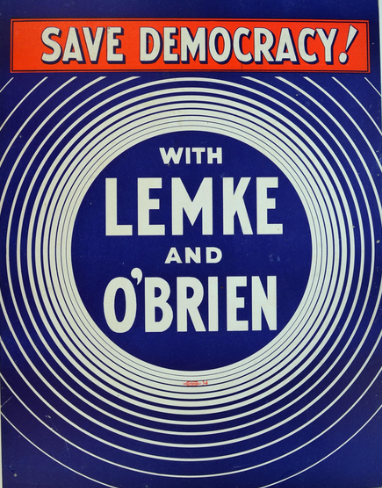Thomas Charles O'Brien, June 19, 1887 (Boston, Mass.) – November 22, 1951 (Boston, Mass.)
VP candidate for Union Party (aka Royal Oak Party aka The Third Party) (1936)
Running mate with nominee: William F. Lemke (1878-1950)
Popular vote: 892,378 (1.95%)
Electoral vote: 0/531
The campaign:
One historical theory behind the creation of the Union Party was that Louisiana Governor Huey "Kingfish" Long or one his surrogates would be the nominee of the new third party, splitting the Democratic vote and robbing FDR of his re-election victory. Then in 1940 Long would ride in to the country's rescue as the new President. But Long's 1935 assassination ended that alleged strategy.
The concept became reality to a degree. The Union Party was a confederation of three groups who had one thing in common-- they hated FDR. Here is how I described the leaders of the factions in an essay I wrote in 2008:
Dr. Francis Everitt Townsend (1867-1960) had proposed in 1933 an old age pension plan for retired citizens over the age of 60– grants of $200 a month funded by a 2% national sales tax. A plan like this would’ve been considered socialist in the 1920s, but the reality of the Great Depression made labels less important. The idea took off like wildfire and Townsend Clubs spread by the thousands all over country. In Washington State, over 400 such clubs were in existence by 1950, including places such as Montesano and Satsop ... The Townsendites have been credited by historians with helping to prod the government into creating the Social Security system.
Father Charles E. Coughlin (1891-1979) was a religious/political activist who used radio as his main medium. At first a strong supporter of FDR, he quickly became a bitter and vocal opponent. Coughlin saw Wall Street and Communism as two sides of the same monster, and became increasingly antisemitic and pro-fascist as the decade regressed internationally. I’m not using the term "fascist" as rhetoric, by saying so I mean he really expressed sympathy for Hitler and Mussolini and their treatment of the Jews in Europe. In 1936 the Socialist Party candidate for President denounced the Union Party as fascist, based mostly on Father Coughlin’s presence.
Gerald L.K. Smith (1898-1976) had inherited the Share Our Wealth movement from the freshly assassinated Louisiana demagogue Huey Long. Originally a Disciples of Christ radio evangelist, Smith eventually aimed the SOW program into a white supremacy movement. He later became a prominent American Holocaust denier and all-around hate-spewing nutcase.
The historian William Manchester gives his take on the Union Party: "… Father Coughlin and his colleagues preempted the lunatic fringe, presenting for the voters’ consideration their new Union Party. The Union candidate for President was Congressman William Lemke of North Dakota, a strange individual with a pocked face, a glass eye, and a shrill voice; to the radio priest’s dismay he insisted upon wearing a gray cloth cap and an outsize suit. Coughlin baptized him ‘Liberty Bill,’ and Gerald L.K. Smith drew up plans to guard the November polls with a hundred thousand Townsendite youths. The radio priest promised to quit the air forever if he didn’t deliver nine million votes for the Union ticket. That seemed extravagant, but in June both major parties were taking Lemke seriously … The sobriquet ‘Liberty Bill’ was catching on. Father Coughlin rather liked the alliterative resemblance to ‘Liberty Bell.’ Then, too late, he remembered something: the Liberty Bell was cracked."
The Union Party belonged to Coughlin more than anyone else. After attempting to lure Northern Tier Senators William Borah of Idaho, Burton Wheeler of Montana (the Progressive Party VP nominee in 1924), or Floyd B. Olson of Minnesota, the Party settled on Republican Rep. Lemke. For VP they chose Boston Democrat Thomas Charles O'Brien.
O'Brien was simultaneously running for the US Senate in Massachusetts as a member of the Union Party in race that would be won by Republican Henry Cabot Lodge Jr.
Lemke and Coughlin predicted an Electoral College deadlock to the press, but in the end it was an enormous Roosevelt landslide. With votes recorded in 37 states the Lemke/O'Brien ticket finished strongest in Lemke's home state of North Dakota (13.41%), followed by Minnesota (6.58%), Massachusetts (6.45%), Rhode Island (6.29%), Oregon (5.27%), Wisconsin (4.79%), Ohio (4.39%) and Michigan (4.20%).
The Union Party fell apart after the election. FDR's administration had managed to co-opt several of their economic issues.
Election history:
1912 - Massachusetts House of Representatives (Democratic) - defeated
1913 - Massachusetts House of Representatives (Democratic) - defeated
1914 - Massachusetts State Senate (Democratic) - defeated
1925 - Mayor of Boston, Mass. (Nonpartisan) - defeated
1930 - Democratic primary for US Senate (Mass.) - defeated
1936 - Democratic primary for US Senate (Mass.) - defeated
1936 - Republican primary for US Senate (Mass.) - defeated
1936 - Governor of Massachusetts (Union Party) - defeated
Other occupations: baggageman, brakeman, soda clerk, bicycle repairman, labor attorney, Massachusetts Board of Parole 1913-1916, appointed District Attorney for Suffolk Dist. 1922-1927, Massachusetts Deputy Director of Prisons 1916-1919, Boston's Commissioner of Penal Institutions 1919
Buried: ?
Notes:
Catholic.
Died from a heart attack.
Graduate of Harvard and Harvard Law School.






